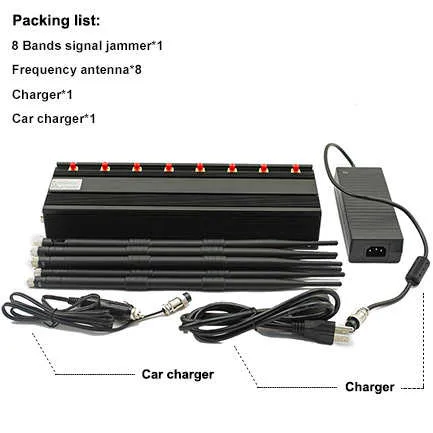Hard-to-Trace and Stop Attacks Using GPS Jammers for Less than $50
We have become very dependent on global positioning. A power outage will cost us billions of dollars. And there is no backup yet.
The dire threat of GPS could cripple corporate America
A growing problem for GPS: There is no backup system in the United States. Most of our critical infrastructure, including power grids, banks, transportation systems, and telecommunications networks, relies on GPS. In addition to traffic maps and other positioning services, GPS is used for high-precision timing required for high-speed financial transactions, wireless network synchronization, and grid synchronization. But the rising risk of severe blackouts has gone largely unnoticed. "I don't think GPS vulnerabilities have gotten a lot of attention because, unlike cybersecurity, there haven't been any major disasters," said Marc Weiss, a fellow at the National Institute of Standards and Technology.
GPS and other timing systems will become even more important to modern life in the future. With the rise of connected sensors, devices and machines (i.e. the Internet of Things), timing signals need to be more precise. A government report last year concluded that a lack of high-precision timekeeping systems could hinder the development of new technologies, such as instantaneous collision avoidance systems in cars or communication links in smart grids.
The United States is at greater risk than countries such as Russia, China, Iran, Saudi Arabia and the United Kingdom, all of which have some form of ground backup. GPS outages happen from time to time because the signal is weak and highly susceptible to interference. "Terrorists can just use a GPS jammers to carry out an attack," Goldward said. Each jammer costs less than $50 and is extremely difficult to track and stop. Note that companies such as Spirent UK provide equipment to assist in the detection of GPS interference to help combat such interference.
The Global Positioning System provides navigation for our ships at sea. It is at the heart of the new next-generation air traffic control system. It can even time-stamp the millions of financial transactions that take place around the world every day.
GPS faces threats from terrorists, rogue states and $50 cell phone jammer
- Criminals, terrorist groups and rogue states, even those with a basic GPS jammer you can buy for $50 on the Internet, face extreme challenges, said Todd Humphreys, a GPS expert at the University of Texas. big risk.
- "If you were a rogue state, or a terrorist network, and you wanted to cause some massive damage — maybe not an explosion, but an economic attack on the United States — that's what you might do." As a weakness," he told Fox News.
- Humphreys was the keynote speaker at the UK ICT Knowledge Transfer Network's World Experts Conference in London. His predictions about the prospects for this emerging threat are dire.

In 2010, for example, British researchers aimed a low-altitude GPS signal jammers at a test ship in the English Channel. The results were shocking: the ship went off course without the knowledge of the crew. Passing false information about their location to other ships increases the likelihood of a collision. The communications system stopped working, meaning the crew could not contact the Coast Guard. The emergency services system used to guide rescuers is completely out of order.
-
Then there's the disappearance of a U.S. drone over Iran. Humphreys believes Iranian authorities confuse the ultra-sophisticated RQ-170 spy drone into landing mode by using simple jamming techniques. The drone's Achilles' heel? It has a civilian GPS system, not a military-grade encrypted model. It doesn't take much to blind it and force it down.
-
Another threat that is burgeoning is so-called "spoofing." Unlike gsm jammer, which block or scramble GPS signals, "spoofers" mimic information from satellites. It can fool an aircraft, ship, or other GPS-guided device into thinking it's somewhere, but it's not.
-
Organized crime is already trying to exploit this possibility, Humphreys said. A criminal gang may hijack a container truck full of high-value cargo and trick the owner into thinking the truck is heading to a predetermined delivery point instead of the gang's warehouse.
-
Hanvers: "Civilian GPS signals are completely open and vulnerable to spoofing attacks because they have no authentication and no encryption. It is almost trivial to imitate these signals and trick a GPS receiver to track your signal." Authentic ."
- Hijacking a container is one thing. Deceiving the global financial system is another matter. Another emerging GPS threat, Humphreys warned in a speech in London, is global stock and commodity trading networks.

Every transaction is time-stamped using a GPS clock. Computer programs monitor these timestamps with millisecond precision. If something goes wrong, many projects will be taken off the market. Hackers could easily interfere with these timestamps, triggering trading procedures, causing sudden liquidity crises and potentially mini-market crashes, Humphreys said.
Manipulating time, then, pays high dividends. An unscrupulous trader or criminal organization can make millions of dollars by delaying time even by a fraction of a second.
"You're able to match prices between networks in a different way than anyone else in the world," Humphreys said. “Everyone else in the world might be off by 20 milliseconds, and you happen to know the actual time. So you can buy low in one market and sell high in another.”
These devices are illegal in the US, but can be easily obtained on the Internet for as little as $50. People use them to avoid tolls, to hide from the prying eyes of their spouses, or to use company vehicles for unintended purposes. This sometimes has unintended consequences.
Devices that interfere with GPS may actually have a legitimate purpose: to protect individual privacy, he said.
"People have a right to privacy in their own lives," he said. “However, having a small dot-sized GPS tracking device to be able to secretly locate them at your friends — they would want to resort to some kind of jamming or deception to defend against this invasion of privacy.”
